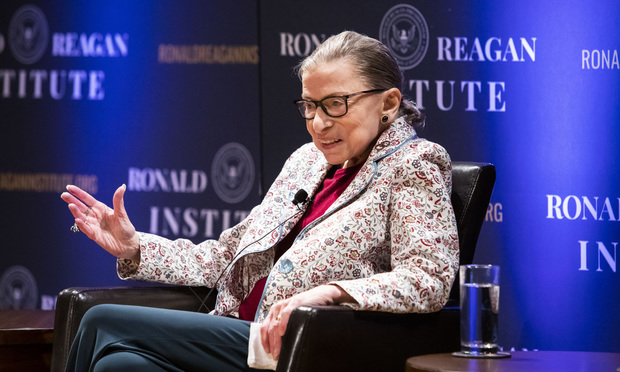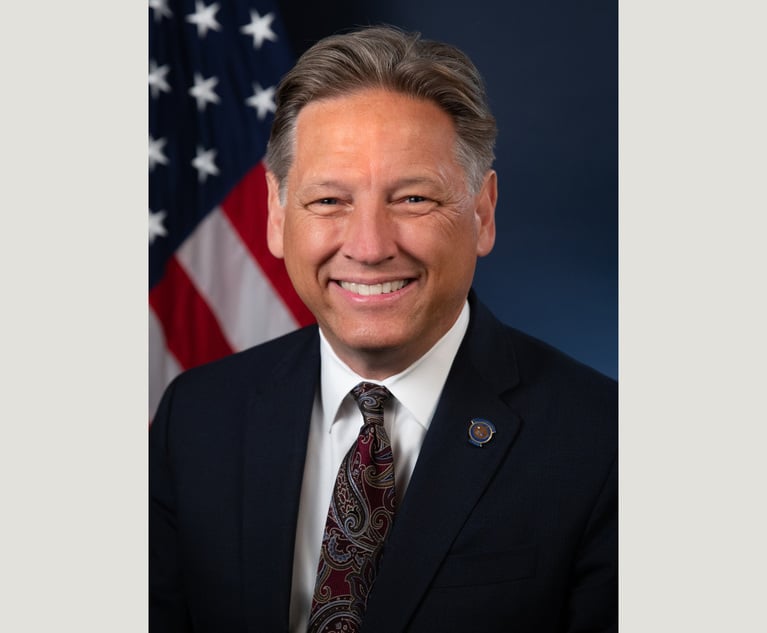Ginsburg Rebukes 9th Circuit Panel for 'Radical Transformation' of Appeal
The principle of "party presentation" refers to a long-standing feature of the court system that the parties in litigation, and not judges, are responsible for raising the legal issues a court must resolve.
May 07, 2020 at 02:31 PM
6 minute read
The original version of this story was published on National Law Journal
 Justice Ruth Bader Ginsburg speaking in September in Washington. Credit: Diego M. Radzinschi / ALM
Justice Ruth Bader Ginsburg speaking in September in Washington. Credit: Diego M. Radzinschi / ALM
In an opinion Thursday, Justice Ruth Bader Ginsburg, speaking for a unanimous U.S. Supreme Court, had unusually harsh criticism of a federal appellate panel for a practice that some court experts say the justices often embrace themselves.
Violation of the "party presentation" principle—central to Thursday's ruling—is not often the basis for deciding a high court case. The principle refers to the long-standing feature of the court system that the parties involved in litigation, and not judges, are responsible for raising the legal issues a court must resolve.
That principle rarely appears in a Supreme Court decision, and the ruling was all the more remarkable that its author—Ginsburg—rebuked a panel of the U.S. Court of Appeals for the Ninth Circuit in accusatory terms that said the court's "transformation" of a case went "well beyond the pale."
Ginsburg's opinion was in the case United States v. Sineneng-Smith. Evelyn Sineneng-Smith, who operated an immigration consulting firm in San Jose, California, was convicted of violating a federal law making it a felony to "encourage or induce an alien to come to, enter, or reside in the United States, knowing or in reckless disregard of the fact that such coming to, entry, or residence is or will be in violation of law."
Sineneng-Smith helped undocumented immigrants apply for labor certification even though she knew they did not meet the application-filing deadline. For her services, she collected more than $3.3 million from them between 2001 and 2008. In appealing her conviction, her attorney raised the same arguments presented to the district court, but then her appeal moved "onto a different track," according to Ginsburg.
"Instead of adjudicating the case presented by the parties, the appeals court named three amici and invited them to brief and argue issues framed by the panel, including a question Sineneng-Smith herself never raised earlier: 'Whether the statute of conviction is overbroad … under the First Amendment,'" Ginsburg wrote.
Lawyers for the parties to the appeal were assigned a secondary role, Ginsburg said. The three amici appointed to brief and argue were the circuit's Federal Defender Organizations (as a group), the Immigrant Defense Project, and the National Immigration Project of the National Lawyers Guild. The panel identified three issues for the briefing and gave amici 20 minutes to argue and 10 minutes to Sineneng-Smith's counsel.
"The party presentation principle is supple, not ironclad," Ginsburg wrote. "There are no doubt circumstances in which a modest initiating role for a court is appropriate. But this case scarcely fits that bill."
Although a court is not "hide-bound" by a party's counsel's precise arguments, Ginsburg said "the Ninth Circuit's radical transformation of this case goes well beyond the pale." The Ninth Circuit's judgment was vacated and the case remanded "for reconsideration shorn of the overbreadth inquiry interjected by the appellate panel and bearing a fair resemblance to the case shaped by the parties."
The court, in another unusual move, issued an addendum identifying cases from 2015 to 2020 in which the justices called for supplemental briefing or appointed an amicus curiae. Ginsburg, in a footnote, wrote: "None of them bear any resemblance to the redirection ordered by the Ninth Circuit panel in this case."
In the addendum, the court highlighted cases where it sought supplemental briefing to decide whether a controversy existed to support review in the first place; to determine whether a case could be resolved more narrowly than the question presented; and whether a constitutional issue was implicated by the question presented, among other reasons.
The Ninth Circuit panel that decided the case below included Judges A. Wallace Tashima, Marsha S. Berzon, and Andrew D. Hurwitz. Judge Stephen Reinhardt, a member of the panel who heard argument in the case, died while it was pending and was replaced by Hurwitz.
Some appellate lawyers were quick to note that the justices were criticizing the Ninth Circuit panel for "something the justices do all the time—focus on issues not raised in the parties' briefs," as law professor Steve Vladeck put it.
One recent example was the court's order for supplemental briefing on whether the political question doctrine or other justiciability doctrines apply to the pending cases on subpoenas of President Donald Trump's financial records.
David Ziff of the University of Washington Law School criticized the addendum to Thursday's opinion.
"The scope of the 'principle of party participation' is completely unclear," Ziff said on Twitter. "The court offers an addendum to explain how its own prior appointments of counsel to present un-advanced arguments are all different. But the addendum doesn't explain why those differences matter."
In a 2009 law review article on the party presentation principle, Amanda Frost of American University Washington College of Law said there are good reasons to promote "judicial issue creation" in certain types of cases.
Frost argued that "federal judges are assigned the task of settling the meaning of disputed questions of law, not just for the parties, but for all who must comply with it. Furthermore, they must do so free from outside influence. As a result, courts have the power to look beyond the parties' arguments when failing to do so would lead to an inaccurate or incomplete description of the law."
In the Supreme Court case, Deputy Solicitor General Eric Feigin represented the government. Mark Fleming, a partner at Wilmer Cutler Pickering Hale and Dorr, was counsel to Sineneng-Smith.
Read more:
Justices Ask if They're Barred From Ruling on Trump Tax Cases in New Hurdle for House
Flush With Embarrassment: Brief History of Awkward Moments at SCOTUS
'A Very Bad Sign for November': Supreme Court Is Assailed for Wisconsin Ballot Ruling
Justice Ginsburg Scorns 'History Lesson' in This Gorsuch Dissent
This content has been archived. It is available through our partners, LexisNexis® and Bloomberg Law.
To view this content, please continue to their sites.
Not a Lexis Subscriber?
Subscribe Now
Not a Bloomberg Law Subscriber?
Subscribe Now
NOT FOR REPRINT
© 2025 ALM Global, LLC, All Rights Reserved. Request academic re-use from www.copyright.com. All other uses, submit a request to [email protected]. For more information visit Asset & Logo Licensing.
You Might Like
View All
After Solving Problems for Presidents, Ron Klain Now Applying Legal Prowess to Helping Airbnb Overturn NYC Ban
7 minute read
DOJ, 10 State AGs File Amended Antitrust Complaint Against RealPage and Big Landlords
4 minute read
Pentagon Settles Suit Seeking to Clear Records of Service Members Discharged for Being LGBTQ
3 minute readLaw Firms Mentioned
Trending Stories
- 1Stevens & Lee Names New Delaware Shareholder
- 2U.S. Supreme Court Denies Trump Effort to Halt Sentencing
- 3From CLO to President: Kevin Boon Takes the Helm at Mysten Labs
- 4How Law Schools Fared on California's July 2024 Bar Exam
- 5'Discordant Dots': Why Phila. Zantac Judge Rejected Bid for His Recusal
Who Got The Work
Michael G. Bongiorno, Andrew Scott Dulberg and Elizabeth E. Driscoll from Wilmer Cutler Pickering Hale and Dorr have stepped in to represent Symbotic Inc., an A.I.-enabled technology platform that focuses on increasing supply chain efficiency, and other defendants in a pending shareholder derivative lawsuit. The case, filed Oct. 2 in Massachusetts District Court by the Brown Law Firm on behalf of Stephen Austen, accuses certain officers and directors of misleading investors in regard to Symbotic's potential for margin growth by failing to disclose that the company was not equipped to timely deploy its systems or manage expenses through project delays. The case, assigned to U.S. District Judge Nathaniel M. Gorton, is 1:24-cv-12522, Austen v. Cohen et al.
Who Got The Work
Edmund Polubinski and Marie Killmond of Davis Polk & Wardwell have entered appearances for data platform software development company MongoDB and other defendants in a pending shareholder derivative lawsuit. The action, filed Oct. 7 in New York Southern District Court by the Brown Law Firm, accuses the company's directors and/or officers of falsely expressing confidence in the company’s restructuring of its sales incentive plan and downplaying the severity of decreases in its upfront commitments. The case is 1:24-cv-07594, Roy v. Ittycheria et al.
Who Got The Work
Amy O. Bruchs and Kurt F. Ellison of Michael Best & Friedrich have entered appearances for Epic Systems Corp. in a pending employment discrimination lawsuit. The suit was filed Sept. 7 in Wisconsin Western District Court by Levine Eisberner LLC and Siri & Glimstad on behalf of a project manager who claims that he was wrongfully terminated after applying for a religious exemption to the defendant's COVID-19 vaccine mandate. The case, assigned to U.S. Magistrate Judge Anita Marie Boor, is 3:24-cv-00630, Secker, Nathan v. Epic Systems Corporation.
Who Got The Work
David X. Sullivan, Thomas J. Finn and Gregory A. Hall from McCarter & English have entered appearances for Sunrun Installation Services in a pending civil rights lawsuit. The complaint was filed Sept. 4 in Connecticut District Court by attorney Robert M. Berke on behalf of former employee George Edward Steins, who was arrested and charged with employing an unregistered home improvement salesperson. The complaint alleges that had Sunrun informed the Connecticut Department of Consumer Protection that the plaintiff's employment had ended in 2017 and that he no longer held Sunrun's home improvement contractor license, he would not have been hit with charges, which were dismissed in May 2024. The case, assigned to U.S. District Judge Jeffrey A. Meyer, is 3:24-cv-01423, Steins v. Sunrun, Inc. et al.
Who Got The Work
Greenberg Traurig shareholder Joshua L. Raskin has entered an appearance for boohoo.com UK Ltd. in a pending patent infringement lawsuit. The suit, filed Sept. 3 in Texas Eastern District Court by Rozier Hardt McDonough on behalf of Alto Dynamics, asserts five patents related to an online shopping platform. The case, assigned to U.S. District Judge Rodney Gilstrap, is 2:24-cv-00719, Alto Dynamics, LLC v. boohoo.com UK Limited.
Featured Firms
Law Offices of Gary Martin Hays & Associates, P.C.
(470) 294-1674
Law Offices of Mark E. Salomone
(857) 444-6468
Smith & Hassler
(713) 739-1250







